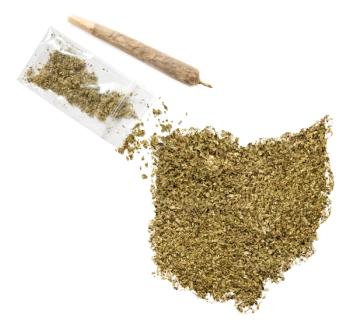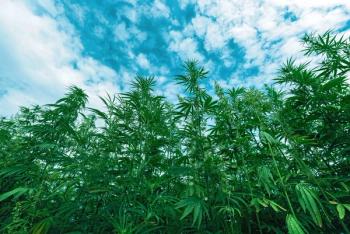New Study Investigates COVID-19 Cannabis Prevention and Treatment
A new study looked into the possibilities of cannabis being used as a treatment in preventing and treating COVID-19, as well as Long-COVID.
A recent study published in the Journal of Clinical Medicine, investigated the role cannabis might play in preventing the coronavirus (COVID-19) and also as a form of treatment for the virus and Long-COVID symptoms (1). The scientific inquiry was conducted by Cassidy Scott, Stefan Hall, Juan Zhou, and Christian Lehmann. Titled (1), “Cannabinoids and the Endocannabinoid System in Early SARS-CoV-2 Infection and Long COVID-19”, the study looked over data from several past studies. These experiments examined if cannabis could be used as a tool to prevent COVID-19 infection and help with Long-COVID symptoms. Researchers saw that there was evidence for cannabinoids, particularly cannabis extracts (1), being able to prevent the COVID-19 virus from entering and infecting cells.
In 2021, a study performed at the University of Chicago (Chicago, Illinois), discovered, “that cannabidiol (CBD) and its metabolite 7-OH-CBD potently blocked SARS-CoV-2 replication in lung epithelial cells,” (2). Another study which predates the 2021 study, was conducted in 2020 by the Dental College of Georgia (DCG) (Augusta, Georgia) and the Medical College of Georgia (Augusta, Georgia), where their study results highlighted that CBD aided in reducing damage in the lungs which were stimulated by cytokine storms caused from the COVID-19 virus (1,3).
Cannabinoids have consistently provided results indicating the further need for research on the cannabis plant and how it can assist in the fight against the COVID-19 virus. The 2021 study explained that (3), “Primarily, the SARS-CoV-2 virus enters host cells through the binding of a surface viral protein—called spike protein— to the human host cell receptor angiotensin-converting enzyme 2 (ACE2). From there, the viral genome is then translated into two large polypeptides that are severed by the viral proteases main protease (MPro) and papain-like protease (PLPro) to produce the proteins necessary for viral replication, assembly, and budding.” Authors of the latest cannabis research (1) reviewed similar findings and urged for its importance.
Additional research from this recent study (1), mentioned the purpose cannabinoids may have with oxidative stress, which is a “significant factor in COVID-19’s pathogenesis.” Specifically mentioned was the CBD cannabinoid being utilized in turning free radicals into lower active forms (1). Such as those witnessed in negative effects caused from a severe COVID-19 infection response, CBD could be a tool to minimize damage to the body (1).
COVID-19 affects individuals differently and no case is the same. Some of the infected may suffer from Long-COVID, a term coined during the pandemic for people with lingering symptoms of the virus that have lingered for weeks, months, or years past infection (4). This recent study also showcased cannabinoids being of assistance in the treatment of lingering symptoms of Long-COVID (1). For example, post-traumatic stress injury (PTSI), anxiety, depression, decreased appetite, pain, and insomnia. Researchers additionally investigated several consumption methods of cannabis, as well as a variety of cannabis products (1). The authors discovered that inhaling cannabis smoke could negative effect consumers who are fighting a respiratory illness and counteract positive effects. “Although smoking and vaporizing cannabis are often preferred by patients, as they provide the fastest onset of effects, it is possible that the potential benefits of cannabinoid treatments are outweighed by the negative respiratory health consequences associated with smoking,” Cassidy Scott, et al, explained (1). “Studies have suggested that the use of cannabis vaporizers is associated with fewer respiratory symptoms than smoking cannabis, as they do not heat marijuana to the point of combustion.”
Cannabis has shown over the last few years that it could help in the fight against COVID-19. It has also proven to be an asset to the medical community in treating various health conditions. Further research is needed on the cannabis plant with the hope that it can be used as a treatment in COVID-19 and other illnesses and disorders.
References
- Ganjapreneur. Study Examines Cannabis as Treatment for COVID-19
https://www.ganjapreneur.com/study-examines-cannabis-as-treatment-for-covid-19/ (accessed Jan 16, 2024). - Colli, M. Groundbreaking COVID-19 Study Shows CBD May Help Inhibit Infection
https://www.cannabissciencetech.com/view/groundbreaking-covid-19-study-shows-cbd-may-help-inhibit-infection (accessed Jan 16, 2024). - Colli, M. COVID-19 Lung Inflammation Reduced by CBD
https://www.cannabissciencetech.com/view/covid-19-lung-inflammation-reduced-by-cbd (accessed Jan 16, 2024). - Long COVID or Post-COVID Conditions
https://www.cdc.gov/coronavirus/2019-ncov/long-term-effects/index.html (accessed Jan 16, 2024).
Newsletter
Unlock the latest breakthroughs in cannabis science—subscribe now to get expert insights, research, and industry updates delivered to your inbox.






